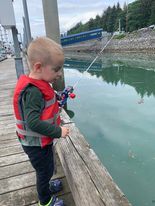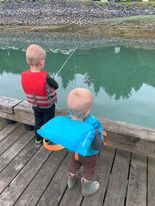Kids are usually full of questions. Typically, my kids will ask "why...?" so many times a day that I sometimes just say "BECAUSE!" and pray that it satisfies their curiosity. In many cases, I feel like kids are better at asking questions than answering them. But why is that and how can we help kids focus on key words in questions that will increase their accuracy in responding?
Asking and answering questions is the perfect conversational turn-taking activity. There is a pattern of a sentence produced with a rise in intonation at the end and then the anticipation of a response, followed ideally with a response that addresses the first production. Then, hopefully expansion on that topic with other details or follow-up questions. But today, we are going to talk about those first two exchanges and how to support children in answering questions that you ask with answers that make sense and are on topic.
Answering wh-questions (who, what, when, where, why) seems like a basic skill in our adult language repertoire but it is another receptive language skill that can require specific focus and activities to master as a child. As a child's vocabulary grows, they begin to make associations with various objects, which helps them understand new concepts and objects. For example, if you introduce the word "glue" to a child and they start producing that word for the first time they begin understanding what "glue" is and how and why they use glue. They may initially associate glue with the vocabulary words paper, scissors, crafts, sticky, etc. I like to think of language acquisition as a web with various connections of words and associations. Anyway, maybe this is a topic for another post. Back to answering questions...
When we ask a question to a child, we are usually expecting them to pick up on a key word: who, what, when, where, or why. Then they have to mentally link associations to the target topic of the question to the appropriate wh-question word used to answer with a semantically appropriate response. See why this takes practice? Errors with this could look something like this:
Adult: Where are your shoes?
Child: Socks!
In that example, the child is hearing the topic "shoes" and linking their first association to that word which is "SOCKS!" and they are completely missing the cue of "where" to indicate they need to answer with a location.
I recently worked on this on my own children while we were fishing off the dock one evening. This was during an activity that they all love, that is hands-on and physically engaging, and gets them outside! Win-win-win!
I kept questions on the topic of fishing: fish, water, sea animals, fishing tools, boats.... you get the idea. I did this to build more connections in that specific area of vocabulary but also to expand on concepts that they already understand. Here are some examples of questions I asked:
- What animals live in the water?
- What do sharks eat?
- Who drives a boat?
- Where do we find seashells?
- When do fish eat?
- Why do we wear life jackets?
I did not sit and just drill my kids with questions while they tried to enjoy fishing - that is no fun for anyone. I did slide questions in as we had quiet breaks in conversation or when a topic came up naturally. An extra challenge you can add for older kids is asking the same question but changing one word to really focus their receptive language on one concepts. For example:
- What do fish eat?
- When do fish eat?
- Why do fish eat?
- Where do fish eat?
OR
- What animals live in the water?
- What animals live in the jungle?
- What animals live in the forest?
- What animals live on a farm?
Emphasizing the key words you want them to focus on is a simple way to bring attention to the right area of the question. Read this question in your mind (or out loud) and stress the word that I have bolded to see how it changes the meaning and focus of the question:
- What do fish eat?
- What do fish eat?
- What do fish eat?
You can adjust the stress of the question based on your child's missed attempt at answering as needed to adjust their focus on the target of the question.





